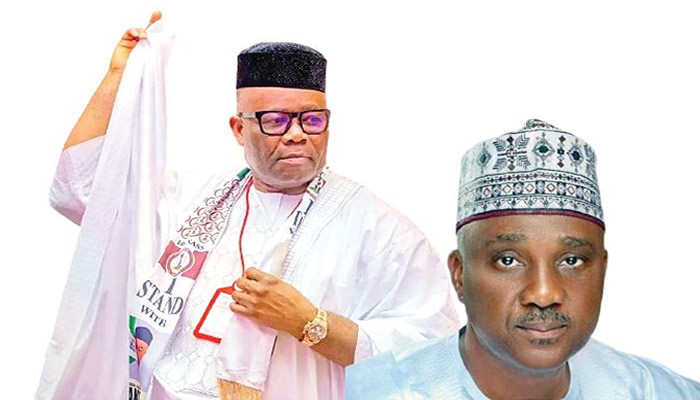
Looking back at the performance of the federal legislature in the past year and its adherence to constitutional responsibilities and legislative goals as it gears up for the resumption of legislative proceedings on July 2, IMOLEAYO OYEDEYI delves into the ongoing dynamics.
Having been in recess, the 10th National Assembly was established on June 13, 2023. Senator Godswill Akpabio and Abbas Tajudeen emerged as the Senate President and Speaker of the House of Representatives after a period of political maneuvering, alliances, and realignments.
During a recent plenary session, Akpabio announced that the legislative proceedings of the 10th National Assembly would resume on July 2, 2024, following a one-month break for the activities marking Democracy Day and the Senate’s end-of-session recess.
In his inaugural address upon assuming office, Senator Akpabio pledged to enact laws for the welfare of Nigerians and provide effective oversight of the executive branch. He emphasized the Senate’s alignment with President BolaTinubu’s vision for national development.
Addressing the Senate, Akpabio expressed optimism about working towards a stronger economy, national security, and adhering to the rule of law under President Tinubu’s leadership.
He stressed the importance of prioritizing national interests above party affiliations and supporting government policies that benefit the Nigerian populace.
Similarly, Speaker Tajudeen highlighted the Assembly’s legislative agenda aimed at addressing the needs of Nigerians and encouraged citizen participation in tackling national challenges.
Under Tajudeen’s leadership, the House of Representatives prioritized issues such as budgeting processes, law reforms, electoral reforms, women’s inclusion in governance, economic development, infrastructure, and constitutional amendments, among others.
As the 10th National Assembly marked its one-year anniversary on June 13, 2024, observers began evaluating its performance in terms of legislative efficiency, bill enactment, legal autonomy, and executive oversight.
While some critics argue that the Assembly has shown weaknesses reminiscent of past legislative bodies by being overly compliant with the executive branch, others believe that a year may not suffice to fully assess its impact on governance and the populace.
Despite differing viewpoints, the Senate recently revealed that its members introduced 477 bills within the year, with 25 of them successfully passed into law.
Senate leader Opeyemi Bamidele highlighted the Assembly’s ongoing efforts to address national priorities in line with its constitutional mandate, emphasizing the legislative progress made since its inauguration.
The constitution mandates fundamental national priorities to be upheld.
The Senate has not only focused on legislative activities but has also passed 115 resolutions crucial for economic development and national stability. These resolutions have arisen from motions of national significance presented by various senators following thorough deliberation.
The Senate leader emphasized that the assessment of legislators should not be solely based on the number of bills enacted into law. He attributed the relatively low number of fully passed legislations to the Senate’s involvement in addressing other critical national priorities outlined in the Constitution of the Federal Republic of Nigeria, 1999.
Furthermore, the Senate leader highlighted the strategic collaborations undertaken in the past year with key public institutions, especially the executive branch, to safeguard national interests, ensure macroeconomic stability, promote internal unity, and enhance cohesion among the diverse ethnic groups within the nation.
The Senate has embraced a strategic partnership approach aimed at fostering synergies with other branches of government to promote a functional and inclusive federation, aligning with the revised legislative agenda for enhanced regional and global leadership roles.
Apart from the constitutional review process, the Senate has initiated various processes with specific mandates and objectives, aiming to address critical national concerns and improve governance.
The Senate leader expressed confidence in Nigeria’s increased stability and promising future, emphasizing the collective responsibility to support government initiatives at all levels for economic resilience and equitable development.
The Senate not only focuses on passing bills but also addresses public grievances, having successfully resolved 50 public petitions in the past year. Additionally, it conducted screenings and confirmations of 215 nominees for key political positions, contributing to diverse sectors of governance.
Despite self-commendations by federal lawmakers, criticisms have emerged regarding their acceptance of expensive Sport Utility Vehicles, a move that raised concerns amid economic challenges faced by many citizens.
In an interview with NewsNow, Professor Hassan Saliu, President of the National Political Scientists of Nigeria, acknowledged the Senate’s performance while emphasizing the need for effective legislative interventions to address prevailing hardships in the country.
Reflecting on the legislative-executive dynamics, Prof Saliu highlighted the importance of balanced relations between the two arms of government, stressing the need for more efforts to tackle Nigeria’s numerous challenges comprehensively.
He urged collective action to reexamine societal values and systems, emphasizing the need for proactive measures to drive positive change amidst existing socio-economic and governance issues.
Contrasting views were shared by public interest lawyer and human rights activist, Inibehe Effiong, who criticized the National Assembly’s performance in advocating for the masses’ interests and providing effective checks and balances to the executive’s policies.
Effiong raised concerns about the lack of prioritization of national interests, perceived focus on personal gains, and inadequate legislative oversight, pointing out persistent challenges such as budget padding and limited legislative reforms.
While recognizing some legislative activities, Effiong expressed disappointment in the Assembly’s perceived lack of independence, emphasizing the need for a more proactive and responsive legislative approach to address the pressing concerns affecting the populace.
As socio-economic challenges persist, the effectiveness of the 10th National Assembly in addressing these issues remains under scrutiny, with calls for enhanced legislative actions to alleviate the hardships faced by Nigerians.
